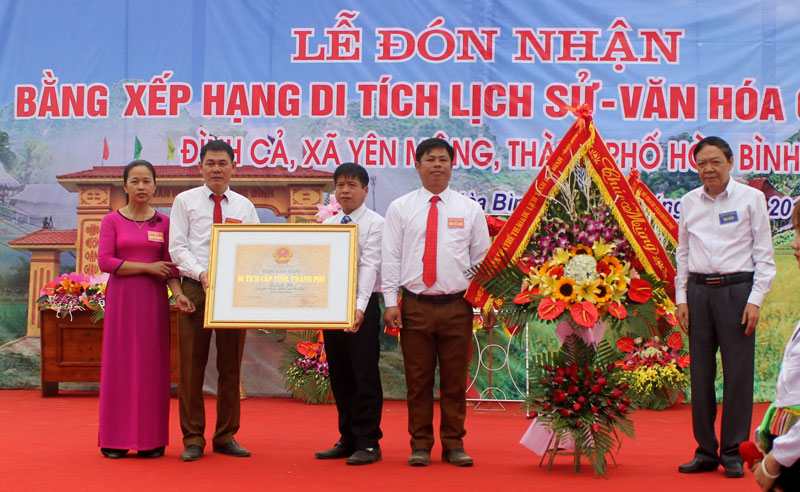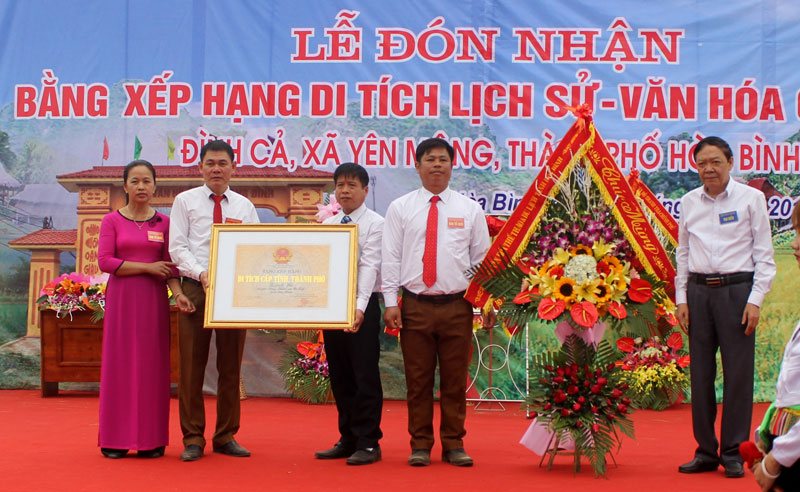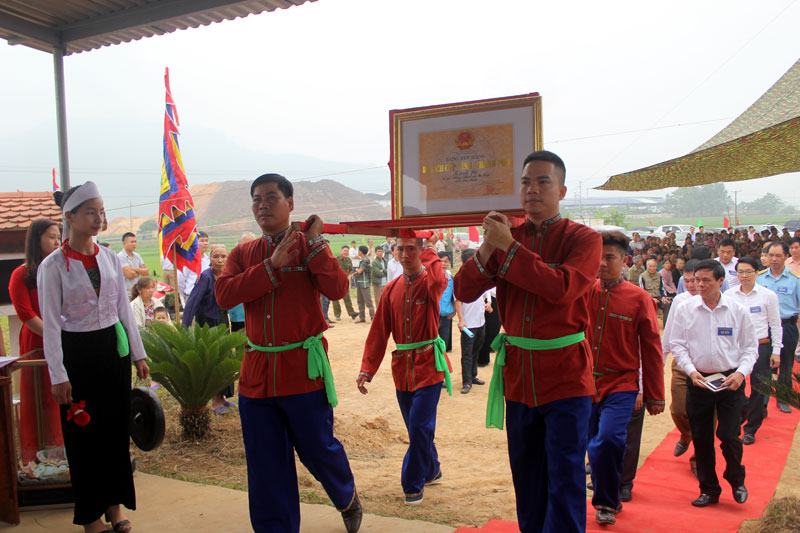
(HBO) - On April 11, Hoa Binh City People's Committee held a ceremony to receive the certificate of the provincially – ranked historical-cultural vestiges of Dinh Ca Temple, Yen Mong commune.

Mr. Bui Ngoc Lam, a Party Member, the
Director of the Department of Culture, Sports and Tourism awarded the ranking
Certificate of the provincial cultural and historical vestiges for Yen Mong
commune.
Dinh Ca Temple was formerly located on the
mound of Lai, a high mound, belonged to Yen Mong village, Hoa Binh commune, Ky
Son District, Hoa Binh province with an area of about 3.000m², facing south
east. This place is dedicated to worship the three mountainous saints of Tan
Vien Son Thanh, the first saint in the list of "four Immortals", which is
mentioned in the Vietnamese folk consciousness. This is an important evidence
of the long history of the formation and development of the area. For over the
years, the ancient house was damaged and many artifacts were lost. By 2014,
with the expense of socialization, the local people built a small house on the
old land of the temple to have a place for praying and worshipping. At present,
the relic still keeps two original relics of the temple and some festive items.
Every year, at the communal house, the
festival is held on the 8th to the 9th of the lunar January. In addition to the
holy procession of the Saint, in the festival days, there are also traditional
folk games that are so deeply cultural and attract people to participate in,
such as shuttle throwing, sticking pushing, tug of war, spindle hitting, etc.
Those rituals and ceremonies of the festival are aimed to educate young
generations about the fine history and culture of the ancestors of their
ancestors up to today.
With historical values, according to the
report of the Department of Culture, Sports and Tourism, the provincial
People's Committee issued Decision No 11 / QĐ-UBND of People's Committee of Hoa
Binh province on November 4, 2018 to recognize Dinh Ca Temple as a provincial
historical – cultural vestige.

The Certificate Procession into Dinh Ca
Temple.
With an increasingly vibrant and widespread emulation movement aimed at building cultured residential areas and cultured families, Yen Thuy District has been making steady progress toward improving both the material and spiritual well-being of its people, while fostering a civilized, prosperous, beautiful, and progressive community.
Once lacking recreational spaces and community facilities, Residential Group 2 in Quynh Lam Ward (Hoa Binh City) has recently received attention for the construction of a new, spacious, and fully equipped cultural house. The project followed the model of state support combined with public contributions in both labor and funding.
The "All people unite to build cultural life" movement, which has been effectively integrated with Kim Boi district’s socio-economic development goals, is fostering a lively spirit of emulation across local residential areas, hamlets, villages, public agencies, and enterprises. In addition, through the initiative, traditional cultural values are being preserved and promoted, while community solidarity and mutual support in poverty reduction and economic development are being strengthened.
A working delegation of the Hoa Binh provincial People’s Committee led by its Permanent Vice Chairman Nguyen Van Toan on June 11 inspected the progress of a project to build the Mo Muong Cultural Heritage Conservation Space linked to tourism services in Hop Phong commune, Cao Phong district.
Born and growing in the heroic land of Muong Dong, Dinh Thi Kieu Dung, a resident in Bo town of Kim Boi district, in her childhood was nurtured by the sweet lullabies of her grandmother and mother. These melodies deeply imprinted on her soul, becoming an inseparable part of her love for her ethnic group's culture. For over 20 years, this love for her hometown has driven Dung to research, collect, and pass down the cultural values of the Muong people to future generations.
In the final days of May, the Ethnic Art Troupe of Hoa Binh Province organized performances to serve the people in remote, mountainous, and particularly disadvantaged areas within the province. These were not just ordinary artistic shows, but they were the meaningful journeys aimed at spreading cultural values, enhancing the spiritual life of the people and contributing to the preservation of ethnic minority cultural identities.




